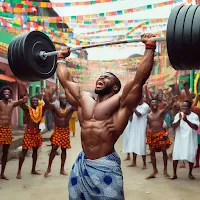I. Introduction
Personal training stands as a pivotal cornerstone in the pursuit of fitness and well-being, globally and within the vibrant landscape of Nigeria. It encompasses a tailored approach to physical fitness, focusing on individualized programs, guidance, and motivation to achieve health goals. In Nigeria, where the significance of fitness and health awareness is growing, personal training emerges as a fundamental element in fostering healthier lifestyles and addressing various health concerns.
In this exploration, we delve into the multifaceted realm of personal training in Nigeria, unraveling its importance, impact, and the factors shaping its landscape. From cultural perceptions to socioeconomic influences and technological advancements, the fundamentals of personal training in Nigeria unfold in a mosaic of elements that reflect the dynamic nature of the fitness industry in this region.
II. The Landscape of Personal Training in Nigeria
Nigeria's fitness industry has experienced a notable evolution, witnessing a surge in interest and investment in personal training services. The landscape reflects a blend of traditional fitness practices and modern approaches, catering to diverse demographics across the nation.
1. Current Status of the Fitness Industry:
Nigeria's urban centers boast a burgeoning fitness scene, characterized by the proliferation of gyms, fitness centers, and health-conscious communities. This growth is propelled by an increasing awareness of the importance of physical fitness among Nigerians, spanning various age groups and socioeconomic backgrounds.
.jpeg) |
| Outdoor Personal Training |
2. Emerging Trends in Personal Training:
With the digital age reshaping industries, personal training in Nigeria has embraced technological advancements. Online coaching, fitness apps, and virtual training sessions have gained traction, offering convenience and accessibility to a wider audience. Additionally, a shift towards holistic wellness approaches integrating nutrition, mental health, and fitness has been witnessed, indicating a more comprehensive outlook on personal training.
The landscape of personal training in Nigeria continues to evolve, blending tradition with innovation, and catering to the changing needs and aspirations of its populace, setting the stage for a dynamic and diverse fitness culture.
III. Key Factors Influencing Personal Training in Nigeria
1. Cultural Perceptions of Fitness and Exercise:
Nigeria's diverse cultural tapestry brings forth varying attitudes towards fitness and exercise. While some communities embrace traditional forms of physical activities deeply rooted in their heritage, others are more receptive to modern fitness practices. Understanding and respecting these cultural nuances play a pivotal role in shaping effective and culturally sensitive personal training programs.
2. Socioeconomic Factors Impacting Access to Personal Training Services:
Disparities in income and accessibility present challenges in providing widespread access to personal training services. Affordability, infrastructure limitations, and geographical constraints often dictate the reach and availability of such services, highlighting the need for inclusive and affordable fitness solutions across socioeconomic strata.
3. Technological Advancements in Fitness Training:
The advent of technology has revolutionized the approach to personal training in Nigeria. Integration of innovative fitness gadgets, apps, and online platforms has expanded the reach of trainers and enabled individuals to engage in fitness activities remotely. However, bridging the digital divide and ensuring equitable access to these advancements remain pertinent challenges.
 |
| Personal Trainer using Fitness Techs |
These key factors underscore the intricate tapestry that shapes the landscape of personal training in Nigeria, necessitating a nuanced approach that considers the interplay of cultural, socioeconomic, and technological dynamics to foster an inclusive and effective fitness environment.
IV. Role of Personal Trainers in Nigeria
1. Importance of Professionalism and Qualifications:
Personal trainers serve as catalysts in guiding individuals towards their fitness aspirations. In Nigeria, the significance of qualified trainers equipped with proper certifications and expertise cannot be overstated. They play a pivotal role in designing tailored fitness programs, ensuring safety, and providing motivation and accountability to their clients.
2. Challenges Faced by Personal Trainers in Nigeria:
Despite their pivotal role, personal trainers encounter various challenges. Obtaining recognized certifications, ongoing professional development opportunities, and access to advanced fitness equipment pose hurdles. Moreover, the need to navigate diverse cultural perspectives on fitness while ensuring effective communication and understanding further underscores the complexities faced by trainers.
Personal trainers in Nigeria stand as pivotal influencers in the fitness journey of individuals and communities, advocating for professionalism while navigating the multifaceted challenges inherent in the industry to deliver quality fitness guidance and support.
V. Balancing Tradeoffs in Personal Training
1. Customization vs. Standardization in Training Programs:
The dichotomy between personalized training regimens tailored to individual needs and standardized programs poses a significant challenge. While customization ensures specificity and relevance to the client's goals, standardization facilitates scalability and consistency in service delivery. Striking a balance between these approaches remains essential to cater to diverse client needs while maintaining quality standards.
2. Affordability vs. Quality of Personal Training Services:
The affordability of personal training services versus the quality and depth of the offered guidance presents a tradeoff. In a market influenced by varying income levels, providing accessible services without compromising on quality emerges as a challenge. Efforts to democratize fitness services while ensuring professional standards and effective outcomes require careful consideration. With this in mind, Jymer is currently offering free personal training programs 😁
.jpeg) |
| Jymer Free Personal Training |
Navigating these tradeoffs is imperative for personal trainers and fitness institutions in Nigeria. Balancing customization with standardization and affordability with quality ensures a dynamic and inclusive fitness ecosystem that caters to diverse needs while upholding professional standards.
VI. Challenges in Personal Training in Nigeria
1. Accessibility and Infrastructure Challenges:
Access to fitness facilities and qualified trainers is limited, particularly in rural areas. Infrastructure gaps, inadequate facilities, and limited availability of certified trainers hinder widespread access to quality personal training services. Bridging this urban-rural divide and improving infrastructure remains a significant challenge.
2. Education and Awareness regarding Fitness and Health:
Despite growing interest, a lack of comprehensive education and awareness regarding fitness and health persists in various communities across Nigeria. Misconceptions, cultural barriers, and limited health education contribute to challenges in promoting the importance of personal training and its benefits, necessitating targeted awareness campaigns and community engagement initiatives.
.jpeg) |
| Group Fitness Class |
Addressing these challenges demands concerted efforts from stakeholders within the fitness industry, policymakers, and community leaders. Enhancing accessibility, promoting education, and fostering awareness can pave the way for a more inclusive and informed approach to personal training in Nigeria, benefiting individuals and communities alike.
VII. Impact on Health and Wellness
1. Benefits of Personal Training on Individuals and Communities:
Personal training's positive impact transcends individual fitness goals, extending to broader health and societal benefits. Tailored fitness programs not only improve physical health but also bolster mental well-being, enhancing productivity and overall quality of life. Furthermore, communities benefit from a healthier populace, reducing healthcare burdens and fostering a more active and engaged society.
 |
| An individual training alone |
2. Influence on Overall Well-being in Nigeria:
Embracing personal training as a cornerstone of health promotion can contribute significantly to Nigeria's overall well-being. By empowering individuals to adopt healthier lifestyles, personal training initiatives have the potential to address prevalent health challenges, such as non-communicable diseases, and contribute to a more robust healthcare system.
The profound impact of personal training on both individual health and the broader societal well-being in Nigeria underscores its importance as a catalyst for positive health outcomes and underlines the need for continued investment and advocacy in this domain.
VIII. Conclusion
In exploring the foundational elements of personal training in Nigeria, a nuanced and multifaceted landscape has emerged. Cultural influences, socioeconomic dynamics, and technological advancements intersect to shape the realm of fitness and well-being in the country.
The significance of qualified personal trainers, grappling with challenges while navigating diverse cultural perspectives, stands paramount in fostering healthier lifestyles. Balancing customization with standardization and affordability with quality remains an ongoing endeavor, crucial for an inclusive and effective fitness ecosystem.
Addressing challenges surrounding accessibility, infrastructure, education, and awareness stands as a collective responsibility. Bridging these gaps holds the key to unlocking the transformative potential of personal training, not just for individuals but also for the wider community.
 |
| A fictional Nigerian Powerlifter |
As Nigeria strives for holistic well-being and improved health outcomes, recognizing and harnessing the profound impact of personal training emerges as an essential pillar. Strategic investment, comprehensive education, and a collaborative approach are vital in ensuring that personal training continues to serve as a catalyst for a healthier and more vibrant Nigeria.
Comments
Post a Comment
Thank you for visiting! Your feedback matters. Please share your thoughts, questions, or suggestions below.